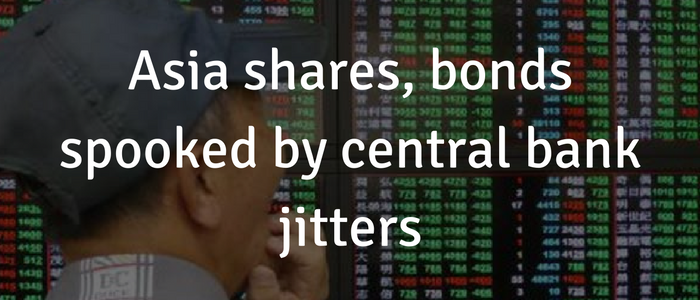Asian shares slipped on Monday with financial specialists shook by rising security yields and talk the Federal Reserve may be not kidding about lifting US loan fees as right on time as one week from now.
MSCI's broadest list of Asia-Pacific shares outside Japan fell 1.1 percent and far from a 13-month crest. Australian stocks dropped 1.8 percent.
The Nikkei 225 lost 1 percent, as a selloff in JGBs sent 10-year respects the most astounding since March.
EMini fates for the S&P 500 ESc1 facilitated 0.2 percent after the record endured its most honed day by day misfortune on Friday since the Brexit vote.
Reports that the Bank of Japan was thinking about approaches to steepen the Japanese yield bend, alongside theory that national banks all the more for the most part were running short on new boost measures, slugged sovereign obligation and danger hankering all around.
Some Fed individuals have been attempting to persuade markets that the September meeting would be "live" for a trek, despite the fact that fates just infer a one-in-four possibility of a move.
No under three Fed speakers are on the docket for Monday, including board part and noted bird Lael Brainard. Any insight of hawkishness would likely further weight bonds and values.
"The level headed discussion on low ostensible swelling and low nonpartisan rates versus powerful work markets and raised resource values keeps on seething on in the US," composed investigators at ANZ.
"Given the split in perspectives communicated in this way, it appears the centralists will have the last say for September. Given what has been said so far it appears like it could go whichever way so prop for somewhat more instability."
The CBOE Volatility list shut at its most abnormal amount since late June on Friday. The Dow shed 2.13 percent on Friday, while the S&P 500 lost 2.45 percent and the Nasdaq 2.54 percent.
Super-low yields have made profits for values appear to be generally more appealing in correlation, so any managed move in yields would likely weigh on stock valuations.
The yield on benchmark German obligation, for example, had turned positive interestingly since July 22 and finished at 0.02 percent, its most astounding since June 23. Yields on US 10-year and 30-year paper hit 11-week crests.
Looking for wellbeing
In the forex market, the sudden episode of hazard avoidance profited places of refuge, for example, the yen while hitting convey exchanges higher yielding monetary standards including the Australian dollar.
The Aussie has lost 1.5 percent against the yen in two sessions to remain at 77.25, while the Japanese coin was firm on the U.S. dollar at 102.55.
The euro was sidelined on the dollar at $1.1237 after powerless German exchange information dragged it down from $1.1271 on Friday. The dollar record, which tracks it against a wicker container of six coinage, facilitated somewhat to 95.287.
Including to the anxious state of mind Monday was news that Democratic competitor Hillary Clinton fell sick at a Sept. 11 remembrance function and had been determined to have pneumonia.
Markets have by and large accepted Clinton would win the administration and have not really considered the suggestions, both financial and for national security, ought to Donald Trump win.
Geopolitical concerns had as of now been excited by North Korea's fifth and greatest atomic test, tightening up a risk that its adversaries and the United Nations have been feeble to contain.
North Korea has finished arrangements for another atomic test, South Korea's Yonhap News Agency covered Monday, refering to South Korean government sources.
In wares, oil costs amplified Friday's 4 percent fall in Asia.
Brent unrefined LCOc1 was off 41 pennies at $47.60 a barrel, while US rough CLc1 lost 49 pennies to $45.39.
For More Detail :- Forex Investment Tips , forex trading tips , currency tips , Live forex trading tips , Forex tips , Currency Trading Tips , Forex HNI recommendations.

No comments:
Post a Comment